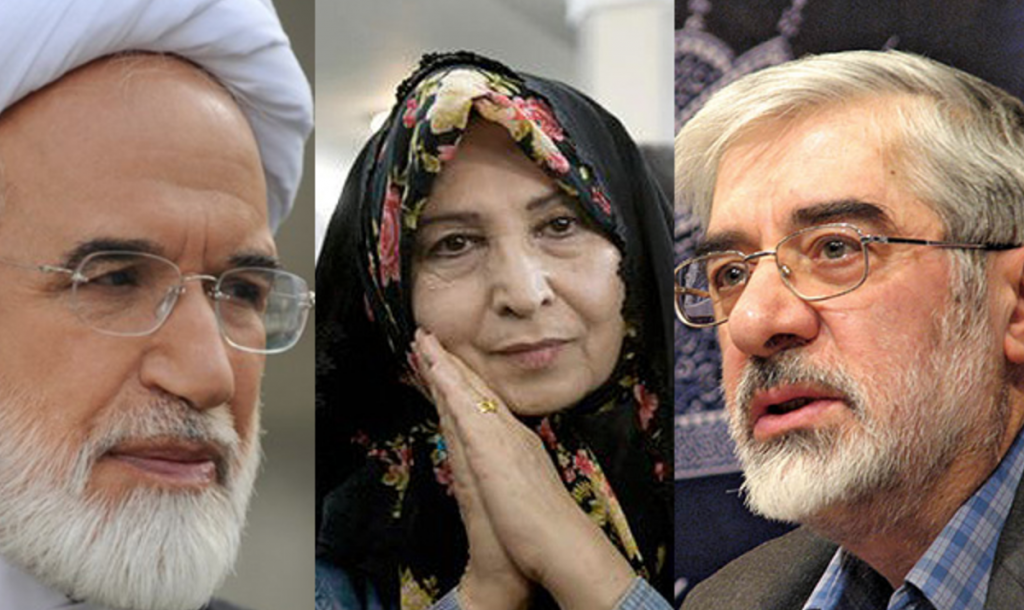Rouhani Government Remains on Sidelines Amid House Arrest Controversy

The government of President Hassan Rouhani continues to avoid taking the initiative to resolve the six-and-a-half-year extrajudicial house arrests of ailing opposition leaders Mehdi Karroubi, Mir Hossein Mousavi and his wife Zahra Rahnavard.
“This issue arose during the previous government, not the current one,” Rouhani government spokesman Mohammad Bagher Nobakht told reporters at a press conference in Tehran on September 5, 2017.
“Everyone knows about the president’s firm position on the house arrests… Let this issue be resolved on its current course,” he added. “We respect the supreme leader’s sublime position. The country’s security is important to us.”
Ending the house arrests was one of President Hassan Rouhani’s top pledges during his 2013 election campaign. Crowds of supporters chanted for the trios’ freedom during many of his campaign rallies in 2013 and again in 2017.
However, after his re-election on May 19, 2017, Rouhani adopted a more cautious line and suggested that a solution depends on cooperation from other branches of state.
Nobakht’s recent statement suggests that the Rouhani government will not attempt to override the reported opposition to freeing the leaders by Supreme Leader Ali Khamenei.
According to officials close to him, Khamenei opposes ending the house arrests until the three express remorse for leading mass protests against the widely disputed result of Iran’s 2009 presidential election.
On August 29, Iran’s Intelligence Ministry agents were withdrawn from inside Karroubi’s home in Tehran and stationed outside the building, honoring a pledge by the Rouhani government made to Karroubi while he was hospitalized for heart complications.
On August 17, Karroubi ended a hunger strike after one day when Health Minister Hassan Ghazizadeh Hashemi and Deputy Intelligence Minister Mohammad Pourfalla agreed to his demands.
However, Karroubi’s second demand for a public trial remains unfulfilled.
On August 20, Judiciary Spokesman Gholam-Hossein Mohseni-Ejei said any change in the status of the house arrests would have to be decided by the Supreme National Security Council (SNSC).
“If the SNSC decides to end the house arrests, the Judicial Branch will act according to its duties,” he said at a press conference.
Asked if Rouhani, as chairman of the SNSC, would raise the issue in the council’s next meeting, government spokesman Nobakht said the president did not have control over the council’s decisions.
“It’s true that the president is the chairman of the SNSC, but it does not operate the same way as the council of ministers,” he said on September 5.
“The SNSC includes commanders of the army and the Revolutionary Guards as well as the heads of other branches of state,” he added. “Therefore he does not have the same authority as the head of the cabinet. Resolving this issue requires consensus and compromise.”
Meanwhile, SNSC member Mohammad Zarghami claimed during a live television interview on September 2, 2017, that Rouhani was present when the council ruled by consensus to put Karroubi, Mousavi and Rahnavard under house arrest.
Recalling an SNSC meeting in February 2011, Zarghami said: “The issue was presented and discussed among all the gentlemen at the meeting. Usually when there’s a consensus, we don’t take a vote. Yes, Mr. Rouhani was there, too.”
Zarghami, formerly the head of the hardline state broadcasting organization (2004-14), added: “Unlike what some people think, the house arrests are a solution not a punishment … If there is a trial, the punishment could be a lot more serious.”
“I am one of those who oppose a trial at this time because I want peace and security for the country and the people,” he added.
Activists and MPs have renewed calls for the elderly opposition leaders to be released after 79-year-old Karroubi was repeatedly hospitalized in the summer of 2017 to receive emergency treatment for heart complications, including low blood pressure.
Mousavi, 75, is also in poor health, according to his family.
“We have no good news to report from our meeting ,” tweeted Zahra Mousavi Khamene after meeting with her parents, Mousavi and Rahnavard, on August 2. “Only unkept promises, signs of my father’s critical health, without knowing what is happening.”





